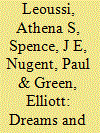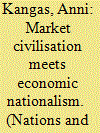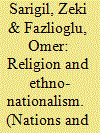|
|
|
Sort Order |
|
|
|
Items / Page
|
|
|
|
|
|
|
| Srl | Item |
| 1 |
ID:
121872


|
|
|
|
|
| Publication |
2013.
|
| Summary/Abstract |
Immigration from the different regions in Spain to the Basque Country has traditionally opposed Basque and Spanish nationalism. This article provides an overview of the discourse of both nationalist traditions with respect to the intra-regional migration movement of the second half of the twentieth century as well as of the resulting controversy. Whereas the Basque nationalist movement claims to have defended the need to integrate immigrants since the middle of the twentieth century, particularly through politics, Spanish nationalism claims that Basque nationalism has helped marginalise these same immigrants. A qualitative analysis is used to contrast this controversy by consulting the opinion of the Spanish immigrants who settled in the Basque Country and did not avail of the political integration proposed by Basque nationalism. The main conclusion is that these immigrants tend to avoid the heart of the matter of discord between both nationalist traditions, granting little importance to political and cultural elements though stressing their social integration in the Basque Country.
|
|
|
|
|
|
|
|
|
|
|
|
|
|
|
|
| 2 |
ID:
121868


|
|
|
| 3 |
ID:
121873


|
|
|
|
|
| Publication |
2013.
|
| Summary/Abstract |
This article studies 1923 compulsory population exchange between Greece and Turkey through a case study of its experience in Izmir. It traces the ways the early Republican state engaged in the project of reshaping the population by eliminating the non-Muslims who were rendered as 'excesses' in the spatial and discursive matrices of the nation-state. Through the experience of the exchange in Izmir, it argues that the process of the accommodation and assimilation of the exchangees played a significant role in shaping the modalities of Turkish nationalism by creating new lines and fissures, further dividing the 'Muslim brethren' into ever restrictive constructions of Turkishness. It also underlines that this forced displacement is not just a significant episode in Greek and Turkish histories but that it represents a turning point in the project of nation formation in general.
|
|
|
|
|
|
|
|
|
|
|
|
|
|
|
|
| 4 |
ID:
121875


|
|
|
|
|
| Publication |
2013.
|
| Summary/Abstract |
This article examines how the discourse of nation functions as a mechanism furthering the expansion of a neoliberal market civilisation in Russia. It contributes to discussions that have challenged the assumed mutual exclusivity of economic nationalism and neoliberalism. The article develops its argument in the context of the idea of contemporary international society as a market civilisation characterised by an adaptation to and adoption of neoliberal standards by states. The ongoing modernisation project in Russia illustrates the workings of such standards, as exemplified by the project for an innovation city in Skolkovo, in the Moscow metropolitan area. Building on an analysis of the Skolkovo debate, the article agues that there is no inherent contradiction between economic nationalism and neoliberalism. Rather, the nation is an important symbolic system that produces a cultural susceptibility to, and a discursive field for, the introduction of neoliberal standards of market civilisation in Russia.
|
|
|
|
|
|
|
|
|
|
|
|
|
|
|
|
| 5 |
ID:
121870


|
|
|
|
|
| Publication |
2013.
|
| Summary/Abstract |
The Alka is a traditional game in Croatia, held to commemorate the victory of the local warriors of the region of Cetina over the Ottoman army in 1715. The Croatian nationalist discourse of the 1990s tried to reinvent the Alka as symbol of a certain national identity, by nationalising this local event and emphasising its religious aspect. In a period of just over a decade, however, the project of reinventing the Alka has failed completely. This paper analyses the reinvention of the Alka and its failure in order to argue that concrete cases of invented tradition are context dependent and may encounter practical limits.
|
|
|
|
|
|
|
|
|
|
|
|
|
|
|
|
| 6 |
ID:
121874


|
|
|
|
|
| Publication |
2013.
|
| Summary/Abstract |
One approach within the Islamic camp treats Islam, which emphasizes overarching notions such as the 'Islamic brotherhood' and 'ummah', as incompatible with ethno-nationalist ideas and movements. It is, however, striking that in the last decades, several Islamic and conservative groups in Turkey have paid increasing attention to the Kurdish issue, supporting their ethnic demands and sentiments. Even more striking, the leftist, secular Kurdish ethno-nationalists have adopted a more welcoming attitude toward Islam. How can we explain such intriguing developments and shifts? Using original data derived from several elite interviews and a public opinion survey, this study shows that the struggle for Kurdish popular support and legitimacy has encouraged political elites from both camps to enrich their ideological toolbox by borrowing ideas and discourses from each other. Further, Turkish and Kurdish nationalists alike utilize Islamic discourses and ideas to legitimize their competing nationalist claims. Exploring such issues, the study also provides theoretical and policy implications.
|
|
|
|
|
|
|
|
|
|
|
|
|
|
|
|
| 7 |
ID:
121871


|
|
|
|
|
| Publication |
2013.
|
| Summary/Abstract |
Why do some newly formed regimes incorporate religion in various dimensions of public affairs, while others relegate religious actors and content to the private sphere? This article offers an explanatory model with four key components that together determine the status of religion in newborn political regimes: (1) the pervasiveness of religion in the old order; (2) the overlap among different ingredients of national-identity; (3) the constraints of demographic realities; and (4) the period before and during the formation of the new regime as critical juncture. The model is applied and tested in the cases of Israel and Turkey, which in many respects represent opposite trends - accommodation and marginalization, respectively - that produced broad and long-term consequences for their respective political regimes.
|
|
|
|
|
|
|
|
|
|
|
|
|
|
|
|
| 8 |
ID:
121869


|
|
|
|
|
| Publication |
2013.
|
| Summary/Abstract |
Research shows that the more people identify with a national in-group, the more their citizenship representation becomes in line with the citizenship discourse attached to this national-identity. However, although national identification may lead to a preference for a specific citizenship representation, national identification might itself depend on preexisting citizenship representation preferences. In line with this, a longitudinal study among Flemish-Belgian high-school students (N?=?275) showed reciprocal relations between national identification and citizenship representation. A second study among Flemish-Belgian high-school students (N?=?407) then showed that strength of national identification does not simply depend on preexisting citizenship representation preferences but on the (mis)match between such preferences and the citizenship representation perceived to be attached to a national-identity. In addition, results showed that the relation between national identification and out-group attitudes depends on the national-identity under consideration.
|
|
|
|
|
|
|
|
|
|
|
|
|
|
|
|
|
|
|
|
|